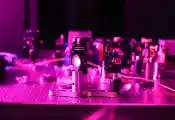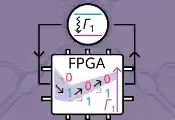Supercomputer and Quantum Computer in Harmony
July 23, 2024 -- Demand for computing power is constantly increasing and the consumption of resources to support these calculations is growing. Processor clock speeds in conventional computers, typically a few GHz, appear to have reached their limit. Performance improvements over the last ten years have focused primarily on the parallelization of tasks using multi-core systems, which are operated in HPC centers as fast networked multi-node computing clusters. However, computing power only increases approximately linearly with the number of nodes. Instead of focusing on a homogeneous setup of identical nodes, development has shifted to the operation of heterogeneous infrastructures consisting of various specialized nodes or accelerators such as GPUs or NPUs, each optimized for a specific calculation.
“With the advent of quantum computers and their potential to solve certain problems in chemistry or materials science much faster than is classically possible, quantum accelerators for HPC computers are a new, very exciting possibility,” explains quantum physicist Thomas Monz, assistant professor at the University of Innsbruck and CEO of the spin-off AQT.
Researchers and developers at the University of Innsbruck und AQT started to investigate the integration of a quantum computer into an HPC environment in the context of the FFG-funded project HPQC. Building on top of standardised interfaces for quantum computers, the team in Innsbruck successfully interfaced the UIBK-operated computing cluster “LEO5” with the “IBEX Q1” quantum computer at AQT. The respective work sets the stage for future research and development on quantum-enabled solutions within heterogeneous infrastructures.
AQT has realized the first quantum computer compatible with standardized 19’’ rack infrastructure. These systems can be readily installed at HPC or data centres. Operating at room temperature with a power consumption of less than 2 kW, this eco-friendly quantum computer offers the highest quantum volume within Europe.
„The successful integration of a quantum computer into a high-performance computing environment marks a significant milestone for Austrian and European research and technology development. This opens up completely new possibilities for mastering complex scientific and industrial challenges and shaping the future of computing. This project impressively demonstrates the innovative strength and technological lead that we can achieve in our country and shows the enormous potential and independence of the EU in quantum technologies. The FFG is proud to support this pioneering development,” says Henrietta Egerth, Managing Director of the FFG.
The infrastructure is currently operated and extended in the context of the HPQC project, focusing on the demonstration of hybrid quantum solutions. Consortium partners such as Math.Tec GmbH in Vienna, or the research group around Prof. Ivona Brandić at the TU Vienna, can directly access and execute computations in this hybrid HPC-QC framework. The consortium builds on top of standardised resource and user management which facilitates the possibilities for notably more users benefiting from the infrastructure in Innsbruck. Besides research and development, the offered solutions shall also find applications in new lectures by the department of computer science, physics or chemistry to train an upcoming generation of quantum-aware researchers and engineers.




































